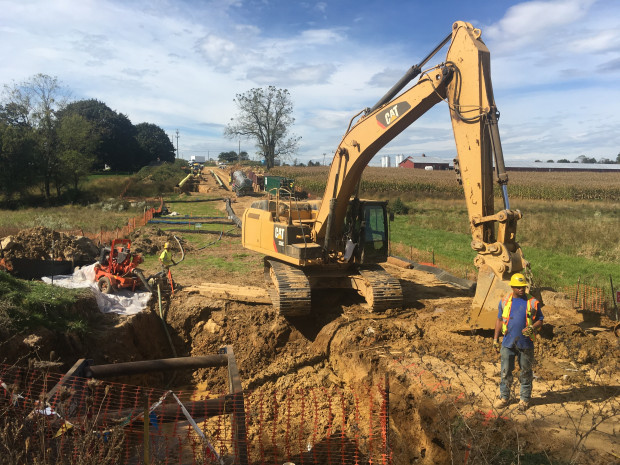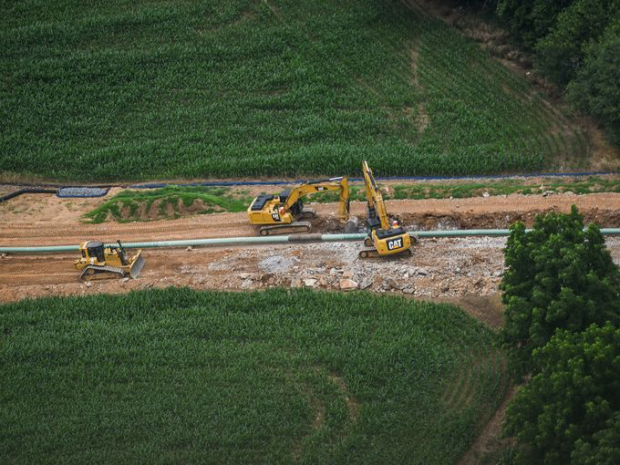Pipeline blasting sprayed Lebanon County home with debris, and may have spread legacy pollution
-
Jon Hurdle

Jon Hurdle / StateImpact PA
A backhoe works at a construction site for the Mariner East 2 pipeline in Lebanon County. Township officials say rock blasting at the site showered a nearby home with debris.
Blasting to remove rock for construction of the Mariner East 2 pipeline in Lebanon County showered a home and its swimming pool with debris, and may have prompted the spread of existing underground contamination from a former gasoline depot, township officials said on Thursday.
Sunoco Pipeline contractors excavating the blasting site on Spangler Road near route 322 in West Cornwall Township in mid-September found a “sheen of some unknown product” on surface water, leading the Department of Environmental Protection to order 8,000 gallons of liquid to be removed and treated as hazardous material.
David Lloyd, a supervisor for the township, said he didn’t know the nature of the material removed on the DEP’s orders, or whether its presence was caused by the blasting.
But Lloyd said at a public meeting that there is a previously known “legacy issue” with MTBE, a gasoline additive, from the former Quentin Terminal, a petroleum storage facility in the township that closed in 1993, with the removal of eight above-ground tanks.
The storage facility was connected to an older gasoline pipeline that has now been repurposed by Sunoco to carry natural gas liquids, and renamed Mariner East 1.
Lloyd and other township supervisors called the meeting in an attempt to correct what it said were some inaccurate rumors about the pipeline construction and its environmental effects in the community.
Although there is no definitive conclusion on whether the blasting caused the “legacy” contamination to spread, that appears to be the case, Lloyd said.
“It appears that the legacy plume migrated under 322 from the north side to the south side, and the blasting brought that to the surface,” Lloyd told reporters after the meeting.
He said Sunoco has now promised to remove contaminated soil to a depth of 10 feet from the Spangler Road site. He said he did not know the nature of the contamination.
Tests on water at nearby properties found two – a private home and a chicken farm – that showed the presence of benzene and MTBE, the township said in a timeline of recent events.

Jeremy Long / Lebanon Daily News
An aerial view of Sunoco Pipeline’s Mariner East 2 construction in rural Pennsylvania. Construction of the pipeline has resulted in dozens of incidents where drilling mud was released into surface water and groundwater aquifers.The latest incident to surface involved blasting, which resulted in debris hitting a home and potential spread of legacy underground pollution.
The report also described three spills of fluid used in horizontal directional drilling (HDD) for the pipeline in the township during September. Two of the spills prompted DEP to order a halt to drilling at those sites.
In July, a state judge ordered a temporary halt to all horizontal drilling on the cross-state line after dozens of spills and multiple complaints from private well owners whose water turned cloudy when drillers punctured aquifers. Drilling has resumed but with tougher oversite from DEP. At the time of the renewed drilling operations, Sunoco had caused 90 drilling fluid spills at 40 sites. Since then, there have been at least 15 additional spills, according to the DEP.
Sunoco provided bottled water and carbon filtration systems to the affected homeowner, and replaced livestock feeding and watering basins at the farm, the officials said.
Lloyd said Sunoco has been responsive to the local complaints but only when pushed. “They have been responsive but the response has been at our urging,” he said.
DEP spokesman Neil Shader said the department is treating the two affected wells, and is continuing to investigate the incidents but does not comment on any possible enforcement actions.
Jeff Shields, a Sunoco spokesman, said the house affected by the blasting was “sprayed with mud” which has now been cleaned up in cooperation with the property owner. He said the responsible contractor has been “removed from this area due to personnel reasons.”
Shields said blasting is a common technique that is used when there is too much rock on a construction site to be efficiently removed using heavy equipment. Blasting is a “permitted activity with strict controls,” he said.
Ann Pinca, president of the anti-pipeline group Lebanon Pipeline Awareness, said the township’s statements show that projects like Mariner East 2 are poorly regulated.
“There’s this public perception with pipeline projects that everything is strictly, strongly regulated, and what we’ve heard today shows that the opposite is true.”
Pinca, one of about 20 attendees, said the spreading MTBE plume shows that responsible officials have not paid sufficient attention to the hazards of building the pipeline in an area of legacy contamination.
She said she is “baffled” why DEP would give permits to a project in an area that is already affected by contamination.
Mariner East 2, which will carry natural gas liquids from southwestern Pennsylvania to an export terminal at Marcus Hook near Philadelphia, is scheduled for completion in the fourth quarter.
















